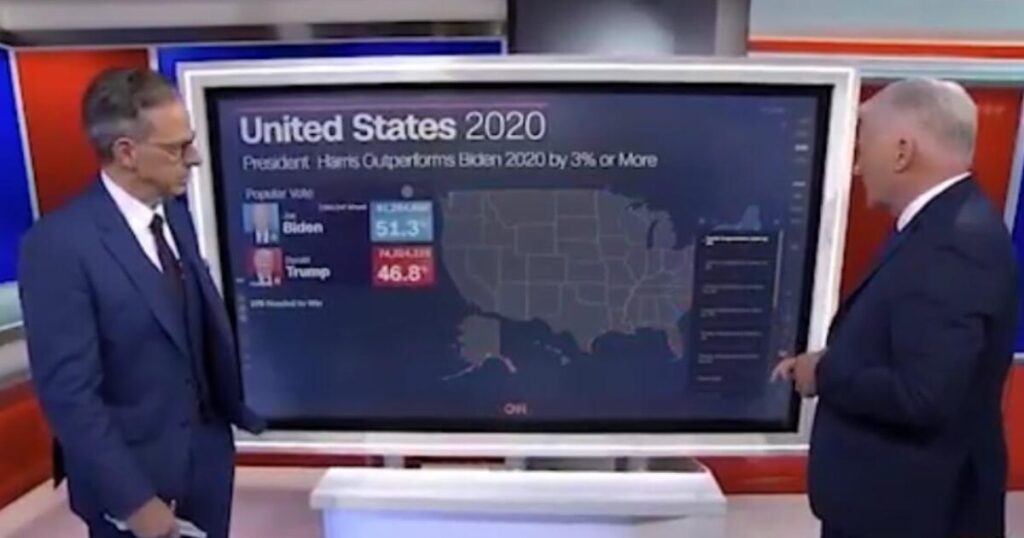In a striking revelation on CNN, anchors Jake Tapper and John King discussed the fallout from the 2024 presidential election, which resulted in a resounding victory for Donald Trump. The electoral landscape showed Trump winning at least 312 electoral votes, and in a surprising twist, both Kamala Harris and Joe Biden appeared to falter compared to Biden’s 2020 performance. John King presented a map that starkly highlighted Harris’s performance, revealing that she failed to achieve a three-percent increase over Biden in any county, prompting astonishment from Tapper as he processed the implications of this information.
The analysis of Kamala Harris’s electoral performance drew attention to the stark contrast with Joe Biden’s earlier victory, thus raising questions about the Democratic Party’s appeal in 2024. King underscored that the analysis did not show Harris making any gains in any county across the nation — an unprecedented outcome for a sitting vice president seeking to ascend to the presidency. This statistic prompted an incredulous reaction from Tapper, who articulated disbelief at the lack of geographic areas where Harris bettered Biden’s results.
The results indicated a troubling trend for the Democrats, with Harris not only trailing Biden but losing the popular vote outright. Analysts noted that more than 15 million of Biden’s 2020 votes had seemingly evaporated, further complicating the electoral dynamics and casting doubt on the party’s electoral strategy. The significant drop in support for the Democratic ticket under Harris raised alarms about the party’s viability moving forward and called into question whether the Democratic National Committee could effectively regroup for future electoral contests.
Throughout the discussion, Tapper and King’s on-air exchange underscored the growing challenges faced by the Democratic Party as they grapple with the implications of Harris’s unforeseen performance. The lack of enthusiasm for her leadership, along with a glaring absence of voter support, raised red flags about her electability should she choose to run for the presidency again in the future. The inability to attract voters in key demographic areas sent shockwaves throughout political analysis circles, igniting debates on potential shifts needed within the party.
Critics and supporters alike scrutinized the implications of these results, with opponents suggesting that Harris’s performance signaled significant weaknesses in the Democratic platform. As Trump reasserted dominance over the political landscape, speculations about future leadership and party direction intensified. This scenario raised questions about Harris’s future role within the party and whether she could rally support for a second bid, or if the party would need to explore alternative candidates or new strategies to connect with a broader electorate.
The aftermath of the election illuminated deeper issues facing the Democratic Party beyond just a single electoral cycle. With the electoral map reflecting such a stark contrast to earlier expectations, many analysts began to call for a reevaluation of the party’s strategies, especially as they look ahead to future elections. The astonishing performance of Republicans drove home the need for the Democratic Party to reassess its approach to voter engagement and policy focus if it hoped to reclaim a foothold in the competitive political landscape.

